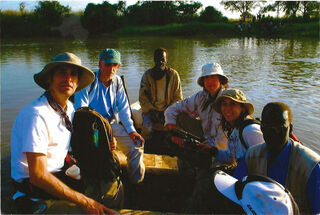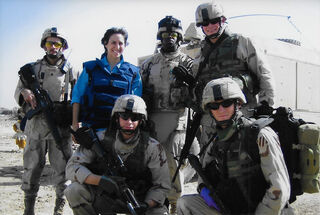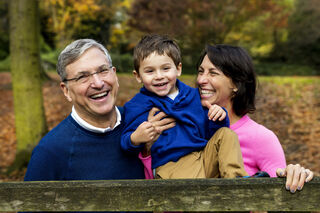Relationships
Becoming a Mom at 43 and a Grandma at 47 Wasn’t My Plan
A Personal Perspective: An unexpected journey led me to lasting love.
Posted February 14, 2022 Reviewed by Jessica Schrader
Key points
- Finding love isn’t a linear path. Unexpected events and outcomes can give us the chance to build self-awareness, empathy, and inner strength.
- Expectations in a relationship can be helpful when they set a realistic standard but can become toxic if communication is weak.
- To build a healthy relationship, couples need to talk about their goals, feelings, and experiences.
I slid into a booth at the Odeon Restaurant in downtown Manhattan feeling like I should have worn lipstick.
I was on a first date with a guy dressed in a perfectly pressed suit who worked in finance.
“Is the king salmon wild?” I asked the waitress.
“Yes,” she said. “It comes with broccoli and whole grain rice.”
I really wanted a burger with fries, but I ordered the lean protein.
Mr. Right wants a woman who eats grilled fish.
“You work in news?” he asked.
“I’m a producer for CNN,” I said with a forced smile. “I love transcribing interviews and producing segments.”
I hoped to be a war reporter. But would Mr. Wall Street want a wife who wore body armor?
Is finding a husband the Holy Grail?
I had expected to have a stellar career and a husband by the time I was 30.
At 28, I had neither.
Instead of focusing on how to become a foreign correspondent, I searched for a soulmate. As if being a Mrs. would cure me of self-doubt and make me feel whole.
Miranda Morris, a clinical psychologist who works with couples, said that women are taught to believe that getting married and having kids is “a recipe that suggests if you can check those boxes, then you have solved [your] problems.”
That is anything but true, she told me. “What I often say to young women is that marriage means you have a whole new set of problems.”
I wish I had gotten in touch with Ms. Morris before I bought my first wedding dress.
Wedding dress #1
I met my first fiancé on a blind date. His business school had the best initials: H.B.S.
He had lots of stock options but no soul. And I lost mine trying to persuade myself that he would worship me when I wore white.
But he couldn’t love me because he didn’t even love himself.
He came by it honestly. His parents were Jews who convinced themselves that their relatives were Pilgrims on the Mayflower, not poor tailors from a shtetl in Eastern Europe, like my Bubbe and Zayde.
His mom showed up at my bridal shower dressed in black and delivered a eulogy. She couldn’t handle losing her son to a woman who graduated from a state college.
Three days before the wedding, the tailor called to confirm where to send the wedding dress.
“It’s gorgeous,” she said. “You will be a beautiful bride!”
“My fiancé called it off,” I told her through tears. “Send it to his mom. She wants to marry him!”
Looking back, it’s not surprising that he backed out. The shock is that I didn’t leave him first.

Weddings are overrated. War reporting is not.
As I wrote in earlier posts, hitting rock bottom set me free. I gave myself permission to let my imagination lead, and I pushed my way into war reporting.
I wanted to travel to Southern Sudan to report on Dinka tribeswomen who were kidnapped from their villages and sold as sex slaves during a 20-year civil war.
At the time, I produced a weekly business show at the women’s network, Oxygen Media. I cornered the CEO at a company party with a plan that included a $20,000 budget. “You need to send me to the Sudan,” I told her. “There have been so many stories on the Lost Boys,” I said. “What happened to the girls?”
Six months later, I camped in a rebel-held village with a human rights group and gave a voice to women who hadn’t been heard.
A Sudanese woman, Queth Atheon, cradled a young baby in her lap and told me, “I was beaten and raped and had a child. We escaped without money or belongings. But I am happy because we're free."
War reporting educated me in life.
In Israel and the Gaza Strip, I met Palestinian and Jewish mothers who shed the same size tears. I learned to listen and not to judge.
In Afghanistan and Iraq, soldiers and civilians endured setbacks and struggles as they fought for a better future. They taught me that empathy, inner strength, and resilience are life’s Holy Grail.
I pushed myself far beyond what I thought my body and mind could manage and became my bravest and most authentic self.

Wedding dress #2
I wanted to show the world I was fixed. What better way than to wear a wedding dress?
Although I learned so much, I had changed so little.
On an aircraft carrier stationed in the Persian Gulf, I met a fighter pilot who had charm, charisma, and amazing biceps.
I created a story in my head and I didn’t let facts get in the way of my fiction.
We had a long-distance romance for three years, while he deployed to Europe and I covered wars, natural disasters, and a presidential race.
When I brought up marriage, he said, “I love you. We’re together. We’ll marry one day.”
His career took him to the Pentagon. I ditched war reporting and worked as a local news reporter in Washington, D.C. I ate dinner alone. A lot.
“I’m working late and won’t make it home to eat,” he told me often.
Instead of leaving him, I bought a strapless white gown and convinced myself that saying “I do” would fix his broken moral compass.
Letting go of expectations
When it all fell apart, I packed my car with boxes filled with clothes, mementos, and broken dreams and drove to my parents’ house in New Jersey.
I divorced the pilot, dove into a new job, and didn’t date. I found my way to a happiness I didn’t envisage.
I turned 40 and celebrated with friends, snowboarding in France and rock climbing in Yosemite. I didn’t mind not being a Mrs.
“Why don’t you try to meet someone online?” a friend suggested.
“I’m not hunting for a husband,” I said. “I’m happy.”
She urged me to join a Jewish dating service called J-date. “Don’t take it so seriously,” she said. “Go have a good time!”
Marriage wasn’t on my mind
I was running late for my date with a lawyer named Jamie, but I couldn’t afford a taxi.
I waited for the subway and felt beads of sweat on my forehead. My hair got frizzy.
I rushed into the restaurant smiling and sticky. He was at the bar.
“Hi,” I said as I felt a pulse of electric chemistry and immediately wanted something more than a handshake. We sat down and talked as if we’d known each other for years.
“What was war reporting like?” he asked.
“It was really meaningful,” I said. “People are so strong and resilient and seem to find a way to survive through such painful situations.”
I told him about my two failed relationships. He got divorced after his two kids went to college.
“Life doesn’t always go the way we expect,” he said. “But we adapt and things have a way of working out.”
The waitress came over three times to take our order.
“Can you give us a few more minutes?” Jamie asked, “We haven’t looked at the menu.”
“I don’t need more time,” I said. “I’ll take a burger if you have one.”

Epilogue: Wedding dress #3
On August 29, 2010, I looked into Jamie’s eyes and said, “I do.”
I’ve learned that to truly love someone else, I had to love myself first.
A healthy marriage isn’t a destination. It’s a path, where we share our dreams, our feelings, and our fears, without judgment or shame. Jamie and I support each other and feel secure enough to take risks.
One week after I turned 43, I held my newborn son in my arms. Four years later, Jamie’s daughter had her first child. Marty was an uncle at 4 and I became "Grammy B” at 47.
None of it turned out like I planned. And I wouldn’t have it any other way.





